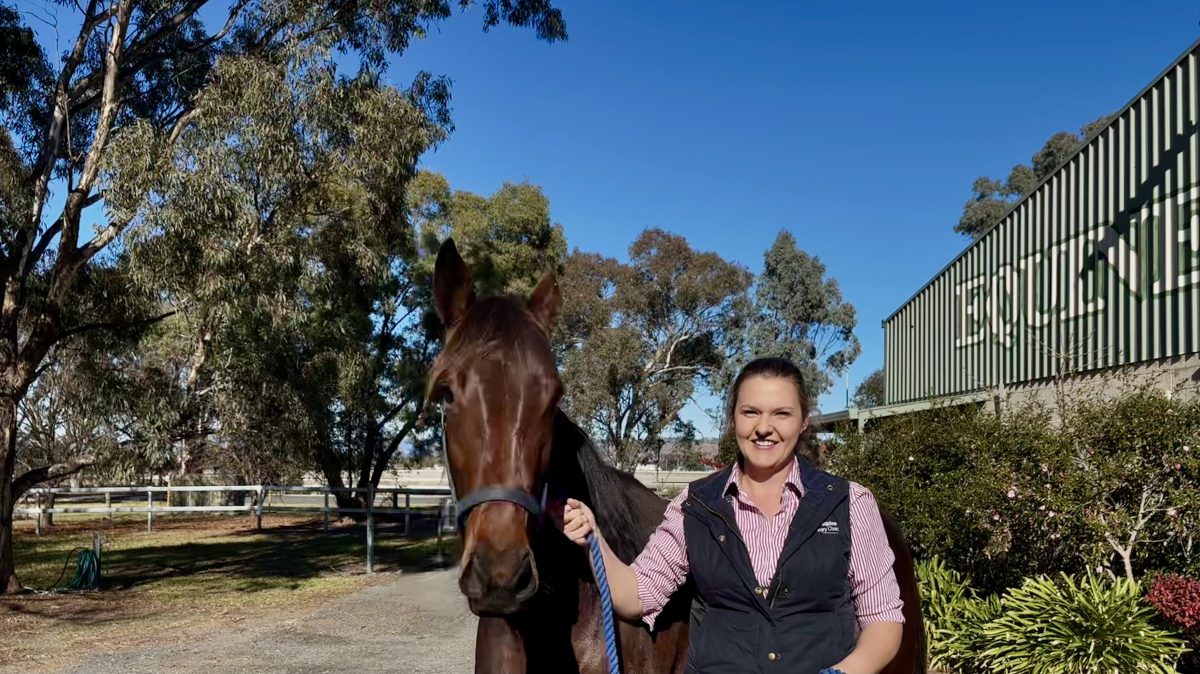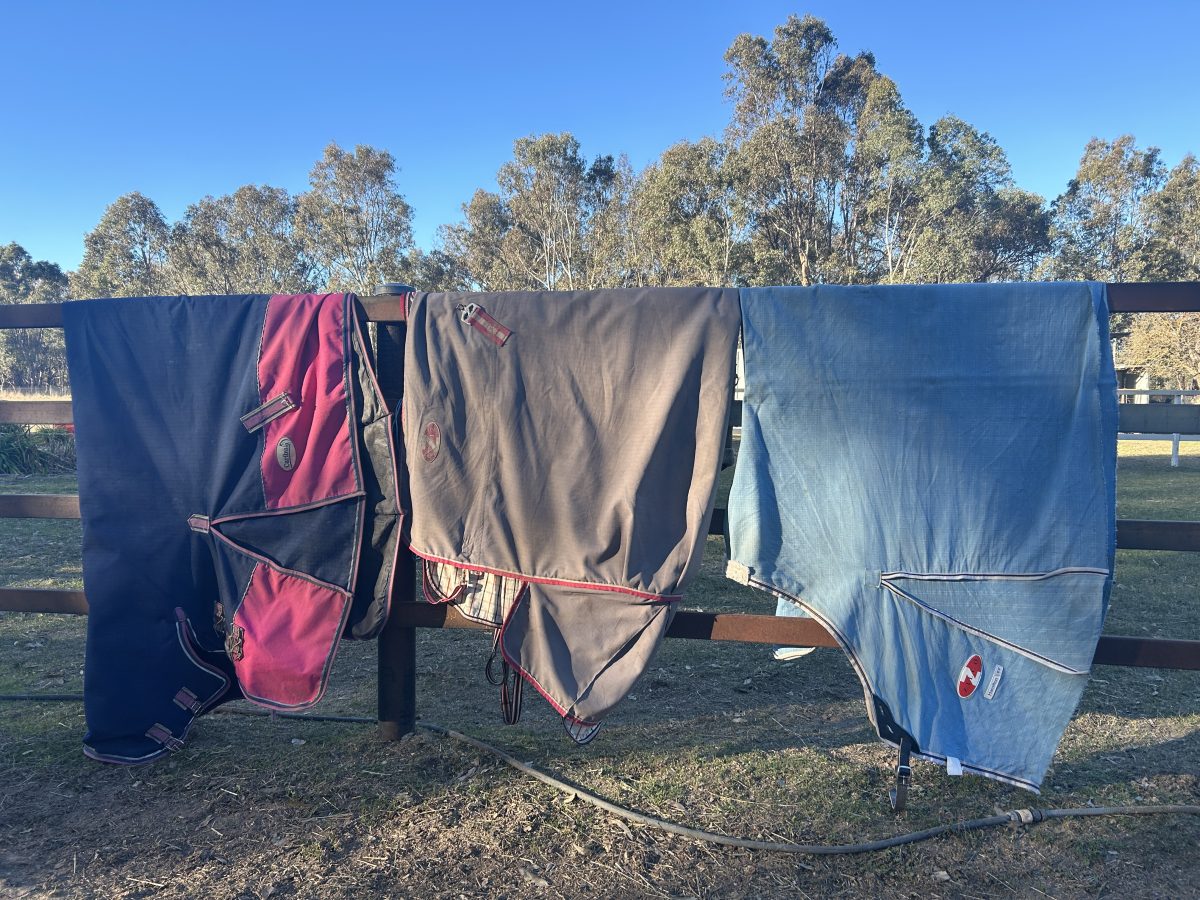
Hume Equine Veterinary Clinic’s Dr Megan Thomas says it’s a good time of year to be extra vigilant when it comes to caring for your horses. Photo: Supplied.
As temperatures drop it’s time to pay extra attention to your horses and monitor their behavior more closely.
Hoof abscesses, colic, weight loss and even a cold can affect horses at this time of year, says Dr Megan Thomas from Hume Equine Veterinary Clinic in Albury.
“Yes, horses absolutely can catch a cold!” she said.
“There are numerous viruses and bacteria which can cause a snotty nose and/or a cough.”
Having a thermometer handy is helpful to horse owners and it’s good to know that a horse’s normal temperature should be between 37 and 38.3 degrees Celsius.
“If your horse is dull, has an increased temperature, is not eating, has perfuse or persistent cough or nasal discharge, it is important to contact your vet,” said Megan.
She cautioned the cause of the ‘cold like symptoms’ would need to be assessed before treatment was prescribed, as in young horses even roundworm infections could cause a snotty nose and cough from the worms migrating through the lungs.
Megan took over Hume Equine Veterinary Clinic in November 2023 and comes with experience in all aspects of equine veterinary practice with a particular interest in equine reproduction and performance work.
Originally from New Zealand, she grew up in Deniliquin and studied veterinary science at CSU in Wagga Wagga.
After her degree she headed north, spending two years working in a mixed practice in Katherine in the Northern Territory.
“I then relocated to Kyabram, Victoria, to work in an equine-only practice where I gained valuable experience in all aspects of equine veterinary medicine and surgery.”
She said winter brought a new set of worries for horse owners.
“Often monitoring water intake is at the forefront of owners’ minds during summer, however it is just as important during winter as the weather cools down.”
During winter, horses’ water intake generally reduces which increases the risk of impaction colics, some of which require surgery to correct.
“To encourage your horse to drink you can add salts to their feed to increase their thirst; the amount you give depends on the size of the horse. You can also choose feeds which have a higher water content, for example soaked beet pulp, gumnuts, bran mash, etc.”
While hoof care is important all year round, to ensure you have a healthier hoof to withstand more riskier times, cold and wet weather increases the risk of abscesses which are very painful for the animal.
“Hoof abscesses develop when bacteria invade the hoof; this can occur if something penetrates the sole or from abnormalities of the white line-like cracks and seedy toe.
“The increased rainfall we normally see during winter make them more prone to abscesses. To avoid these developing, keeping on top of hoof care with your vet and farrier is crucial.”
She recommends owners having plenty of poulticing material on hand which can be used once your vet or farrier gets the abscess draining.
In late autumn and early winter it is a good time to deworm your horses as well, she suggests.
At this time of year, in adult horses, she recommends to treat with a moxidectin and praziquantel wormer (irrelevant of faecal egg count results) to target strongyles and tapeworm.
“We then recommend to have a faecal egg count done every three months to monitor for worm burdens. This is a simple test which can be run using a small amount of manure.”
Megan’s veterinary clinic services all equine patients from racehorses, performance horses, pony club ponies, companion horses to retirees.
She has a particularly strong interest in reproduction, stud and performance horse work.
Having worked with standardbred and thoroughbred stud farms she has experience with foal medicine, live cover, chilled and frozen artificial insemination. She also provides veterinary services at race meetings.
When it comes to feeding your horses she outlines that feeding will vary greatly between animals and will depend on use, age, type, underlying metabolic conditions (laminitis, etc) and access to pasture.
As a general rule, however, she advocates increasing roughage intake over winter.
“Feeding 1.5-3 per cent of body weight in roughage is generally advised and depends on if you are trying to achieve weight maintenance or gain.

Fitting horses with rugs can help prevent undesired weight loss, says Dr Megan Thomas. Photo: Vanessa Hayden.
“The type of roughage will also vary depending on the individual horse; however, for those that can’t eat a lot of hay – older horses, or those with poor dental health – soaked beet pulp is a great source of highly digestible fibre.”
When soaking feeds (bran mash, beet pulp, etc) during winter, warm water can be used.
“Increased roughage availability also helps keep your horse warm from the internal heat generated through digestion.”
When asked what she thought about rugging horses during this time of year, she said again that it varies between owners and horses.
“When the temperature falls below the thermoneutral zone (5-25 degrees) horses burn more calories than usual to keep warm; this can cause weight loss in some horses.
“In horses that struggle to maintain their weight or in older horses, rugging can help prevent undesired weight loss.
“If you are rugging it is important to take your horse’s rug off daily to check them over.”
If rugging isn’t an option, having shelter – a stable, commercial shelter in the paddock or tree shelter – can allow horses to escape wind chill and keep them dry.
Original Article published by Vanessa Hayden on Region Riverina.







